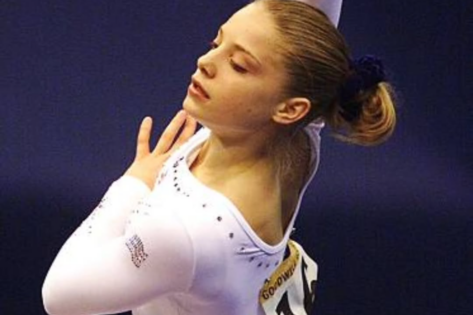In mid-May, a quiet storm rippled across the gymnastics world—just seven seconds long. A clip, shared on X, showed a woman in her 40s executing a wolf jump on the balance beam with elegance and precision that seemed untouched by time. The feat itself was remarkable, as the move is notorious for the strain it puts on even the youngest, strongest ankles. But there she was, defying gravity, and perhaps something even heavier: the weight of a past unfulfilled. The clip sparked awe, but also stirred an old ache. “I still wish she could’ve had her Olympic moment,” the caption read. It was more than a wish—it was a wound reopened.
Vanessa Atler’s prime was dazzling, yes. Two gold medals at the 1998 Goodwill Games—in floor and vault—spoke to her power, artistry, and dominance. But her story was never only about triumph. It became a case study of heartbreak. She came painfully close to Olympic glory. At the 2000 U.S. Classic, she won the All-Around. At the U.S. Championships, she placed fourth. But when it mattered most—at the Olympic Trials—she stumbled just slightly, finishing sixth. It should have been enough. It would have been enough. But it wasn’t. And that’s where the hurt deepens.
In a recent conversation with Inside Gymnastics, Vanessa revisited those moments that changed the course of her life. “It was like they had already known or had a pretty close idea that I wasn’t going to make it,” she said. “I think that was what was hard. Knowing that and then still naming the entire team and zooming in on my face, and not the people that made it, was really just a cruel thing to do.”
As the team was named, the focus lingered not on those who had made it, but on the girl who hadn’t. It was a spotlight she hadn’t asked for. A moment that should have been private—filled with heartbreak and disappointment—was broadcast and immortalized. However, there was more drama in the scene.
“I was so upset that I just said, ‘I don’t want to give them my tears,’” she recalled. “After the second day, I’d already been told that I wasn’t going to make it. Sitting there knowing that you’re not going to make it and thinking, ‘I’m just done. I’m over it. And I’m not going to cry for you guys.” She was twenty. She had carried the pressure of a nation. And in the end, she was left with silence. No explanation. No closure.
However, the 2000 Olympic selection was mired in controversy. A panel, led by Bela Karolyi, used scores from nationals and trials, but ultimately made the decision behind closed doors. Atler was placed sixth. Dominique Dawes, a beloved veteran who placed seventh, was chosen instead. Perhaps it was the experience. Perhaps it was politics. But whatever the reason, it left a young woman in the shadows of the sport she had once illuminated. Thus, Vanessa Atler never got her Olympic moment. But she did not vanish.
Once a gymnastics pro, she now plays a prominent role in eradicating issues
Vanessa Atler didn’t just walk away from gymnastics—she walked back into it with a mission. In the years after her competitive days, Atler stepped into a new role—in the quiet resilience of a coach’s corner. She was especially outspoken about the shadows many gymnasts are forced to navigate, most notably, the eating disorders that haunted her during her time training at the famed World Olympic Gymnastics Academy (WOGA). She knew the pressure. And so, as a coach, she refused to perpetuate the cycle. Instead, she rewrote the rules.
“Teaching about nutrition, energy, and never mentioning weight, being proud of our bodies and the different shapes is important,” Atler said. These weren’t just words—they were values etched into every practice, every conversation, every celebration of strength over size. She taught her gymnasts that power doesn’t come from shrinking yourself—it comes from standing tall in your own body, in all its uniqueness.
What mattered most to her was the growth she witnessed day after day—the transformation of young girls into confident, healthy, empowered young women. For Atler, the most rewarding part of coaching wasn’t about medals. It was this: “being able to help in the process of [the gymnasts] becoming strong, beautiful women.” And that’s why the clip matters.
Not because she stuck a flawless wolf jump at 43, but because she proved something more enduring than medals or moments: resilience. Vanessa Atler may have been denied the podium, but she never surrendered her strength. In those seven seconds, the world saw not just a gymnast reclaiming the beam, but a woman reclaiming her story.
The post “I Wasn’t Going to Make It”: U.S. Gymnastics Star Recalls Heartbreaking Olympic Snub That Still Haunts Her Years Later appeared first on EssentiallySports.
